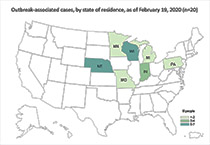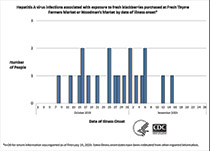Outbreak of Hepatitis A Virus Infections Potentially Linked to Fresh Blackberries
Final Update

Last update published on February 19, 2020 at 2:00 PM ET
This outbreak investigation is over.
Advice to Consumers

CDC recommends that people who purchased fresh blackberries from any Fresh Thyme Farmers Market location (located in 11 Midwest states) or Woodman’s Market (located in Wisconsin and Illinois) during September 9-30, 2019 take the following actions:
- Check your freezer for these blackberries. If you froze them to eat later, do not eat them.
- Throw away any remaining blackberries.
- If you have eaten these blackberries, purchased fresh and later frozen, within the last 14 days and are not vaccinated against hepatitis A, contact your local health department or health care provider to discuss getting postexposure prophylaxis (hepatitis A vaccine or immune globulin). Getting postexposure prophylaxis within 14 days of exposure can help prevent illness.
Final Outbreak Information

- As of February 19th, 2020, this investigation is over.
- 20 outbreak-associated cases of hepatitis A were reported from 7 states (Indiana, Michigan, Minnesota, Missouri, Nebraska, Pennsylvania, and Wisconsin).
- Illnesses started on dates ranging from October 8, 2019, to November 15, 2019.
- 11 people were hospitalized. No deaths were reported.
- Epidemiologic and traceback evidence indicated that fresh blackberries were the likely source of this outbreak.
- In interviews, 19/20 (95%) reported eating fresh blackberries
- Of 17 cases with known fresh blackberry purchase location information, 16/17 (94%) purchased fresh blackberries from either Fresh Thyme Farmers Market or Woodman’s Market
- In interviews, 19/20 (95%) reported eating fresh blackberries
- Reported cases: 20
- States: 7
- Hospitalizations: 11
- Deaths: 0
- Recall: No
What is Hepatitis A
Hepatitis A is a contagious liver infection caused by the hepatitis A virus. The hepatitis A virus is found in the stool and blood of people who are infected. The hepatitis A virus is spread when someone ingests the virus, usually through close personal contact with an infected person or from eating contaminated food or drink. Hepatitis A can be prevented with a vaccine, which is recommended for all children at age one and adults at risk.
Symptoms of Hepatitis A

- Symptoms of hepatitis A usually appear 2 to 7 weeks after exposure and can include
- Yellow skin or eyes
- Not wanting to eat
- Upset stomach
- Stomach pain
- Throwing up
- Fever
- Dark urine or light-colored stools
- Joint pain
- Diarrhea
- Feeling tired
- Not everyone with hepatitis A has symptoms. Adults are more likely to have symptoms than children.
- People who get hepatitis A may feel sick for a few weeks to several months but usually recover completely and do not have lasting liver damage. In some people, though, the illness may be so severe that the patient needs to be hospitalized.
- In rare cases, hepatitis A can cause liver failure and even death. This is more common in older people and in people with other serious health issues, such as chronic liver disease.
February 19, 2020
CDC, public health and regulatory officials in several states, and the U.S. Food and Drug Administration (FDA) investigated a multistate outbreak of hepatitis A associated with exposure to contaminated fresh blackberries sold at Fresh Thyme Farmers Market and Woodman’s grocery stores during September 2019.
As of February 19, 2020, a total of 20 outbreak-associated cases of hepatitis A were reported from 7 states. A list of the states and the number of cases in each is found on the Map of Reported Cases page.
Illnesses started on dates ranging from October 8, 2019, to November 15, 2019. Ill people ranged in age from 14 to 73 years, with a median age of 50. Sixty percent of ill people were female. Of 19 people with available information, 11 (58%) were hospitalized. No deaths were reported.
Investigation of the Outbreak
Epidemiologic and traceback evidence indicated that fresh blackberries were the likely source of this outbreak.
In interviews, ill people answered questions about the foods they ate and other exposures in the 2 to 7 weeks before they became ill. Of people who were interviewed, 19/20 (95%) reported eating fresh blackberries; of 17 people with known fresh blackberry purchase location information, 16/17 (94%) purchased fresh blackberries from either Fresh Thyme Farmers Market or Woodman’s Market. This proportion was significantly higher than results from a survey [PDF – 29 pages] of healthy people in which 7% reported eating fresh blackberries in the week before they were interviewed.
FDA completed its traceback investigation; however, a single, common source of fresh, conventional blackberries could not be identified.
As of February 19, 2020, this outbreak investigation is over.

